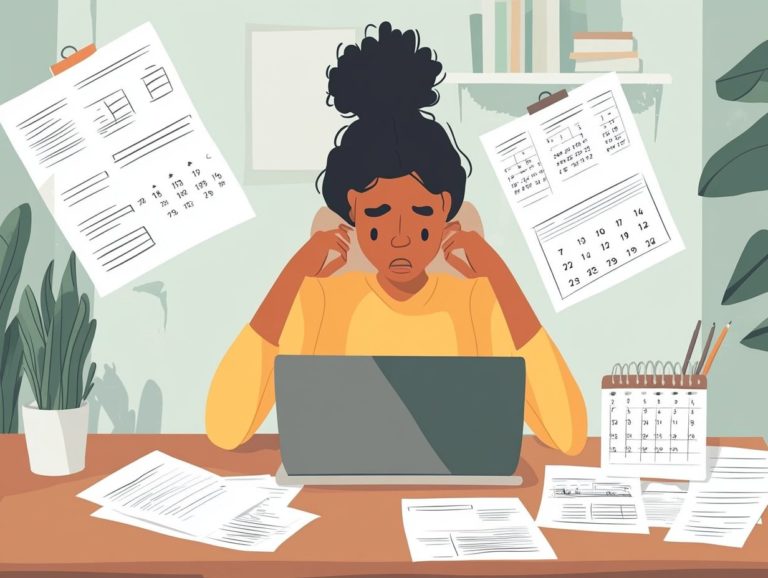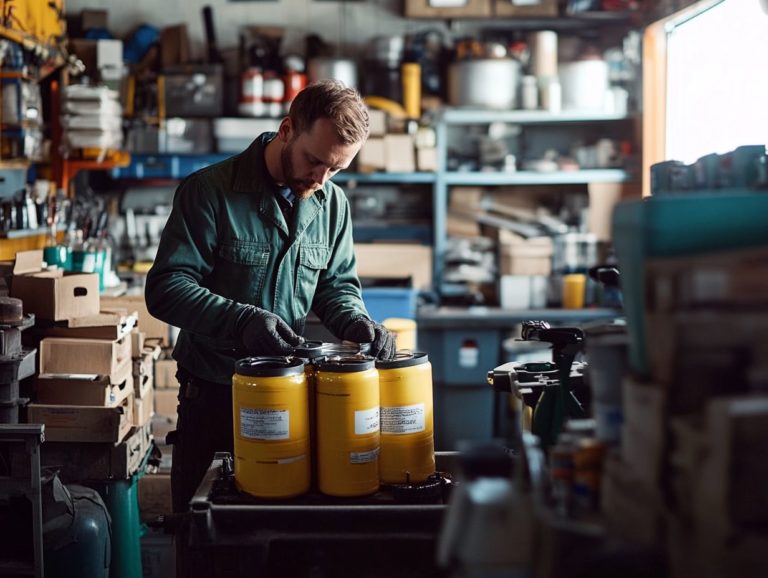The Importance of Regular Filter Changes
Filters are essential for maintaining the efficiency and safety of various systems, from heating, ventilation, and air conditioning (HVAC) units to automobiles.
Regularly changing filters enhances system performance. It also helps prevent damage and health risks. This guide offers valuable insights into the importance of filters, how to recognize signs that a change is necessary, and the consequences of ignoring this critical task.
Discover how frequently you should change filters, the proper methods for doing so, and tips to extend their lifespan. Explore the best practices to keep your systems running smoothly and efficiently.
Contents
- Key Takeaways:
- Filters: Your Key to Clean Air and System Longevity!
- Watch for These Signs That Mean It s Time to Change Your Air Filters!
- The Consequences of Not Changing Filters Regularly
- How Often Should Filters be Changed?
- How to Properly Change Filters
- Tips for Maintaining and Extending the Life of Filters
- Frequently Asked Questions
- What is the importance of regular filter changes?
- How often should I change my filters?
- What happens if I don’t change my filters regularly?
- Are there any benefits to changing filters regularly?
- Can I change my filters myself or do I need a professional?
- Is it necessary to change filters even if they still look clean?
Key Takeaways:
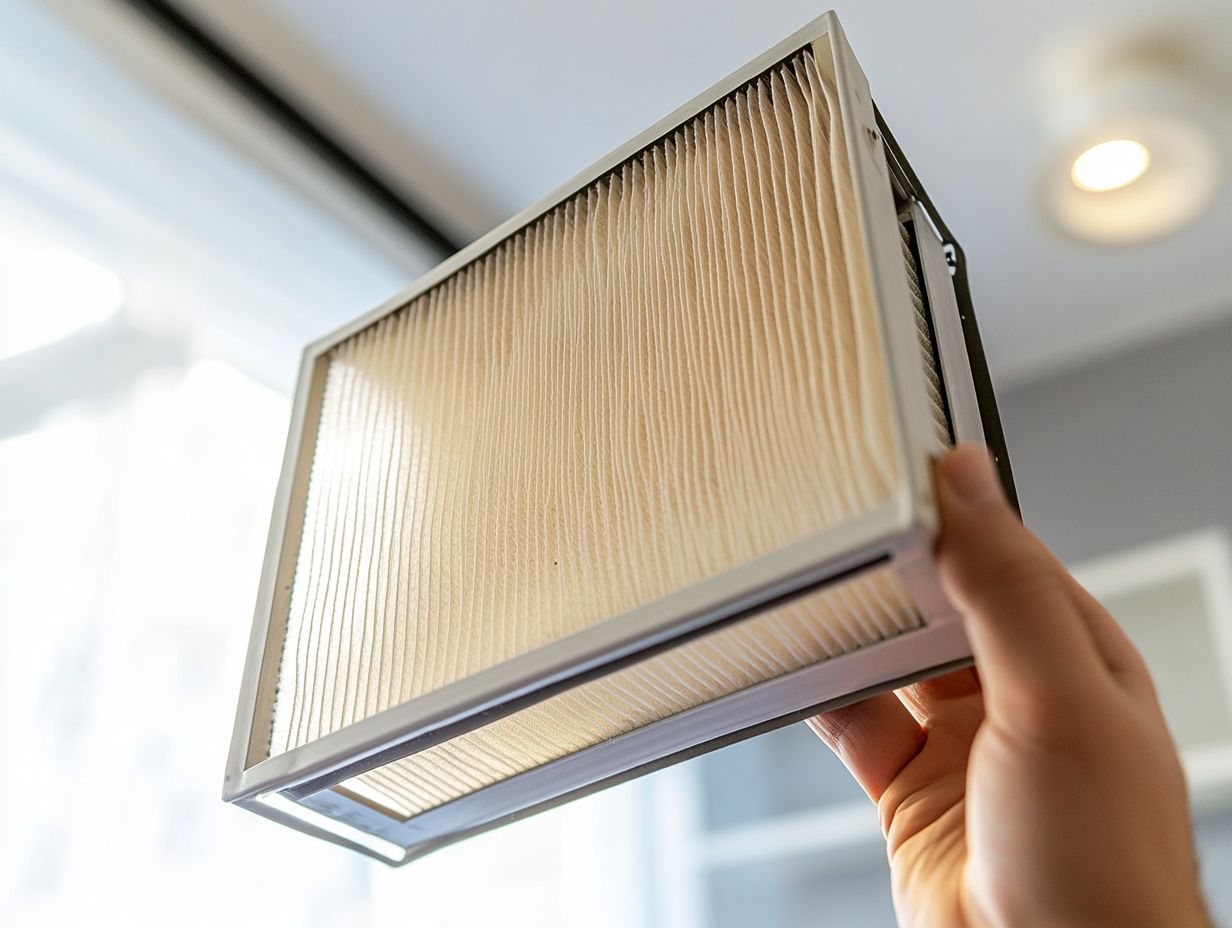
- Understand why regular filter changes are crucial for system efficiency.
- Identify common signs that indicate a filter change is needed.
- Learn how to maintain filters to extend their lifespan and save money.
Filters: Your Key to Clean Air and System Longevity!
Filters are critical components in a variety of systems, especially within HVAC applications. They play a vital role in maintaining indoor air quality by effectively capturing allergens such as dust, dander, and smoke. This ensures that you, as a homeowner in Jacksonville, Florida, can enjoy optimal energy efficiency and comfort in your living space.
The significance of an HVAC air filter cannot be overstated; it directly impacts the effectiveness of your HVAC system and your health. By minimizing airborne particles, these filters help safeguard against respiratory issues, enhancing your overall well-being.
Understanding the Role of Filters in Various Systems
Air filters play a crucial role across various systems, especially in HVAC setups, where their primary task is to purify indoor air by capturing allergens, dust, and other pollutants that can negatively affect air quality.
Unlike the specialized filters used in air purifiers, which target specific airborne particles, HVAC filters are designed to function within a larger system. They focus not only on filtration but also on maintaining optimal airflow and efficiency.
Regular maintenance of these filters is essential. It enhances the energy efficiency of your system while significantly improving overall indoor air quality. For those dealing with health issues such as asthma and allergies, ensuring HVAC air filters are checked and replaced regularly can reduce the presence of irritants, creating a healthier living environment.
You can limit your exposure to harmful particles by ensuring regular filter changes, promoting better respiratory health and overall well-being.
Watch for These Signs That Mean It s Time to Change Your Air Filters!
Be attentive to specific signs that indicate it’s time to change your air filters. Ignoring this crucial aspect of HVAC maintenance can result in diminished air quality, heightened allergens, and potential damage to your HVAC system.
This is particularly important in Jacksonville, Florida, where seasonal shifts can intensify problems like dust accumulation and allergens. Prioritizing regular filter changes not only enhances your indoor environment but also safeguards your system s longevity.
Common Warning Signs
Watch for these common warning signs that signal it’s time for an air filter change: a noticeable increase in dust around your home, reduced airflow from your vents, and allergy symptoms among residents. In places like Jacksonville, Florida, these issues can be particularly pronounced due to local environmental conditions.
For example, if you find dust accumulating on surfaces soon after cleaning, it s a clear indication that you should check your air filter. When airflow diminishes, it can lead to discomfort and place unnecessary strain on your HVAC system, which may ultimately inflate your energy bills.
Allergies can worsen if airborne particles like pet dander and smoke linger longer than they should because filters aren t being replaced in a timely manner. Ignoring these signals can result in declining air quality, creating an environment that invites respiratory issues and general discomfort.
On the flip side, staying on top of maintenance not only ensures cleaner air but also boosts the efficiency of your heating and cooling systems, benefiting both your health and your wallet in the long run. Don’t wait! Check your filters today for a healthier home.
The Consequences of Not Changing Filters Regularly
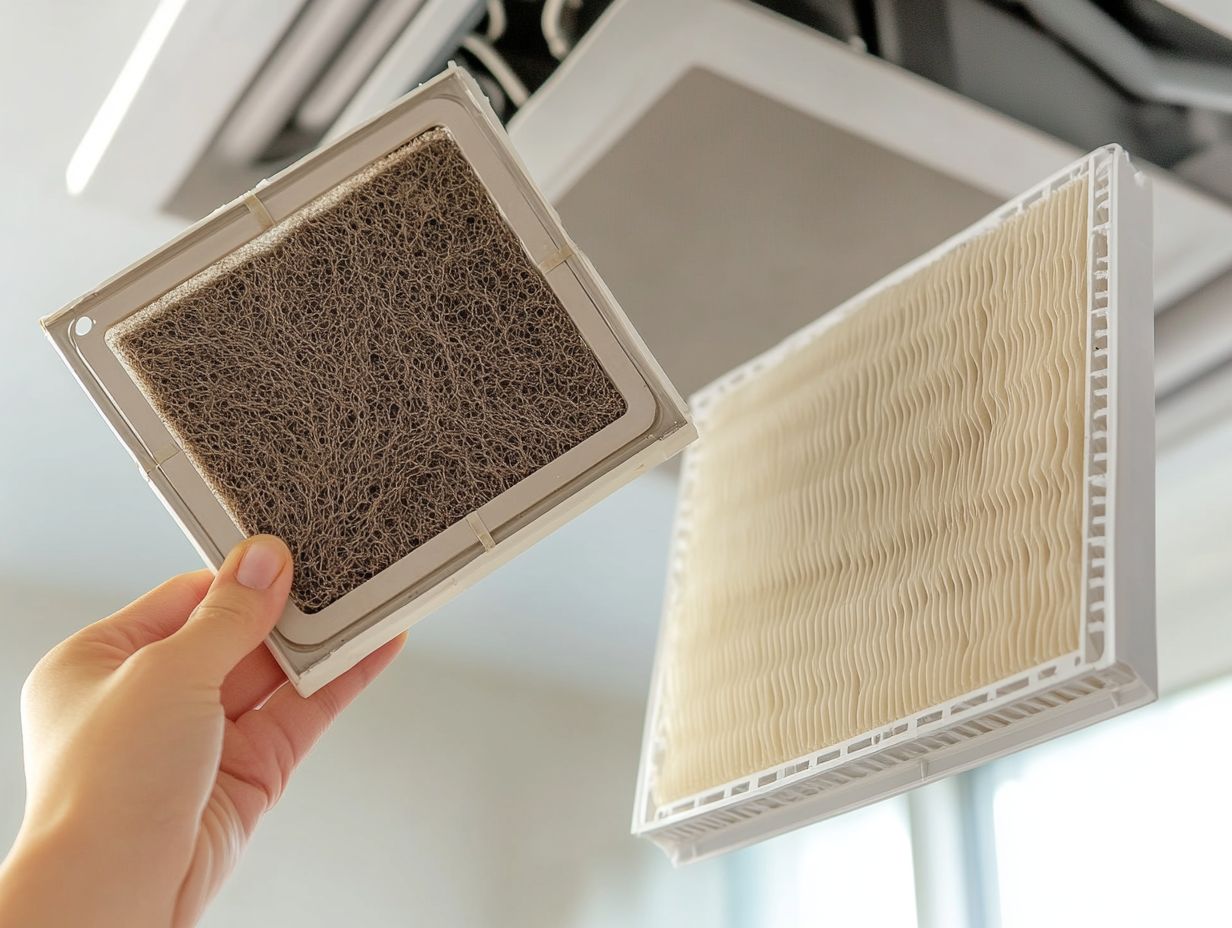
Neglecting to change your air filters regularly can lead to a host of consequences that you definitely want to avoid. You might notice a decline in your indoor air quality. This can exacerbate health issues like asthma and allergies.
An overlooked HVAC system can suffer damage. This leads to higher repair costs and decreased energy efficiency. For homeowners in Jacksonville, Florida, staying on top of air filter maintenance is essential for both health and cost-effectiveness.
Potential Damage and Health Risks
Neglecting air filter changes can cause damage that goes far beyond mere mechanical issues. It can pose serious health risks, such as worsening asthma and allergies, along with an elevated chance of developing cardiovascular disease.
This is particularly concerning for residents of Jacksonville, Florida, where environmental factors may heighten these risks. Asthma impacts about 8% of adults and 7% of children across the U.S. Indoor air quality plays a pivotal role in triggering symptoms.
The American Lung Association highlights that nearly 50 million Americans suffer from allergic rhinitis. This condition can be exacerbated by dust, pollen, and mold thriving in poorly maintained environments.
Inefficient HVAC systems can worsen these problems, especially during the sweltering, humid months when allergens are at their peak. Research indicates a direct link between poor indoor air quality and increased hospital admissions for cardiovascular complications.
This emphasizes the need for regular air filter replacements and professional maintenance to protect health in both homes and workplaces.
How Often Should Filters be Changed?
Make sure to change your HVAC air filters every one to three months. This timeframe can vary based on factors such as the type of filter you use, the conditions within your household, and the specifics of your HVAC system.
In Jacksonville, Florida, this is especially important. Seasonal variations can greatly impact both air quality and energy efficiency.
Factors to Consider for Frequency of Changes
Several factors influence how often you should change your HVAC air filters. These include seasonal shifts, specific household conditions, and the type of air filter in use. If you re in Jacksonville, it s especially important to keep an eye on local pollen levels and weather changes.
As the seasons transition, fluctuations in humidity and temperature impact not only outdoor allergens but also your indoor air quality. This can significantly affect filter performance.
For example, HEPA filters excel at capturing even the tiniest particles, making them a favored choice for those battling allergies. Filters rated for their effectiveness at catching particles, known as MERV-rated filters, offer varying levels of filtration based on their rating.
By staying aware of these factors, you can select the appropriate filter and adjust your replacement schedule accordingly. This ultimately ensures cleaner air and alleviates allergy symptoms within your home.
How to Properly Change Filters
Changing HVAC air filters correctly requires a meticulous, step-by-step approach. This guarantees optimal energy efficiency and air quality. This is especially vital for homeowners in Jacksonville, Florida, where the humidity and allergens can dramatically influence indoor conditions.
Step-by-Step Guide for Different Types of Filters
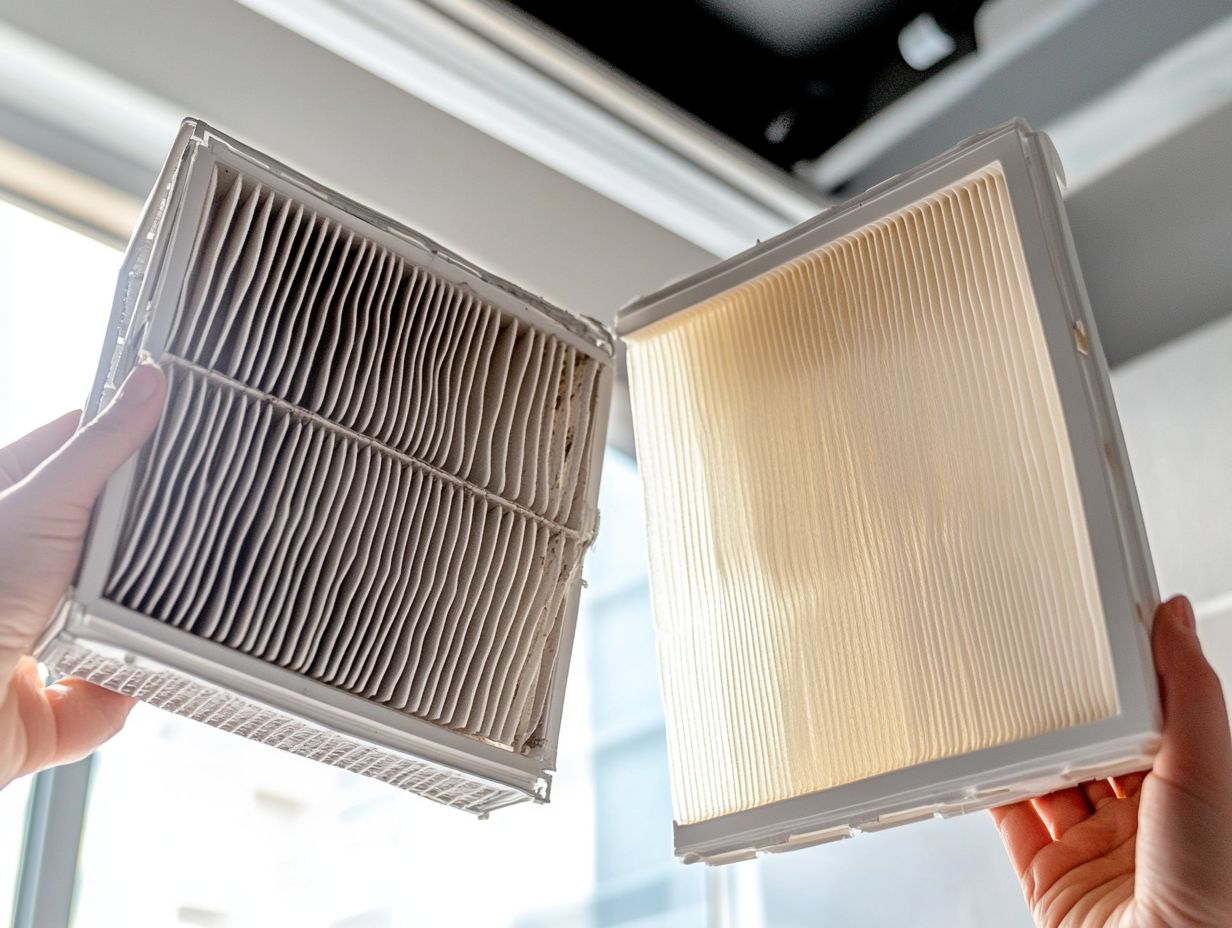
Changing various types of HVAC air filters, from HEPA filters to those with differing MERV ratings, involves a series of specific steps crucial for proper installation and optimal performance. This meticulous approach is essential for maintaining excellent indoor air quality in homes throughout Jacksonville, Florida.
As a homeowner, understanding the nuances of filter types and their functions is key to enhancing your living environment. For example, a HEPA filter excels at capturing airborne particles, which can significantly reduce allergens in the air. A filter with a higher Minimum Efficiency Reporting Value (MERV) rating boosts energy efficiency by preventing dust buildup in your HVAC system.
When it’s time to change a HEPA filter, having screwdrivers and gloves ready is wise. This ensures you create a clean workspace to avoid contamination. If you’re dealing with a MERV-rated filter, remember to switch off the HVAC system for safety. A snug fit for the new filter is crucial, as it prevents unfiltered air from sneaking into your home.
These practices elevate your air quality and extend the lifespan of your HVAC system, highlighting the interconnectedness of healthy living and energy savings.
Tips for Maintaining and Extending the Life of Filters
To ensure the longevity and optimal performance of your HVAC air filters, embrace effective cleaning techniques and adhere to regular maintenance practices. This is crucial in Jacksonville, Florida, where dust, allergens, and humidity can swiftly impact air filter efficiency.
Following these steps will help you maintain a comfortable and healthy indoor environment.
Proper Cleaning and Maintenance Techniques
Proper cleaning and maintenance techniques for HVAC air filters involve regular inspections and the right cleaning methods. This ensures your filters remain clean, crucial for achieving optimal air quality and energy efficiency in homes around Jacksonville, Florida.
To maintain a healthy indoor environment, adopt a routine of checking reusable filters monthly and washing them every three months. For disposable filters, replace them every one to three months. Regular cleaning keeps dust and allergens at bay and significantly enhances your HVAC system’s efficiency.
By adhering to these cleaning schedules, you can reduce energy consumption, lower utility bills, and extend the lifespan of your heating and cooling systems.
Understanding the specific materials used in filters will help you choose the best cleaning method, ultimately enhancing performance.
Frequently Asked Questions
What is the importance of regular filter changes?
Regular filter changes help maintain the efficiency and functionality of various systems and equipment, including air filters, oil filters, and water filters.
How often should I change my filters?
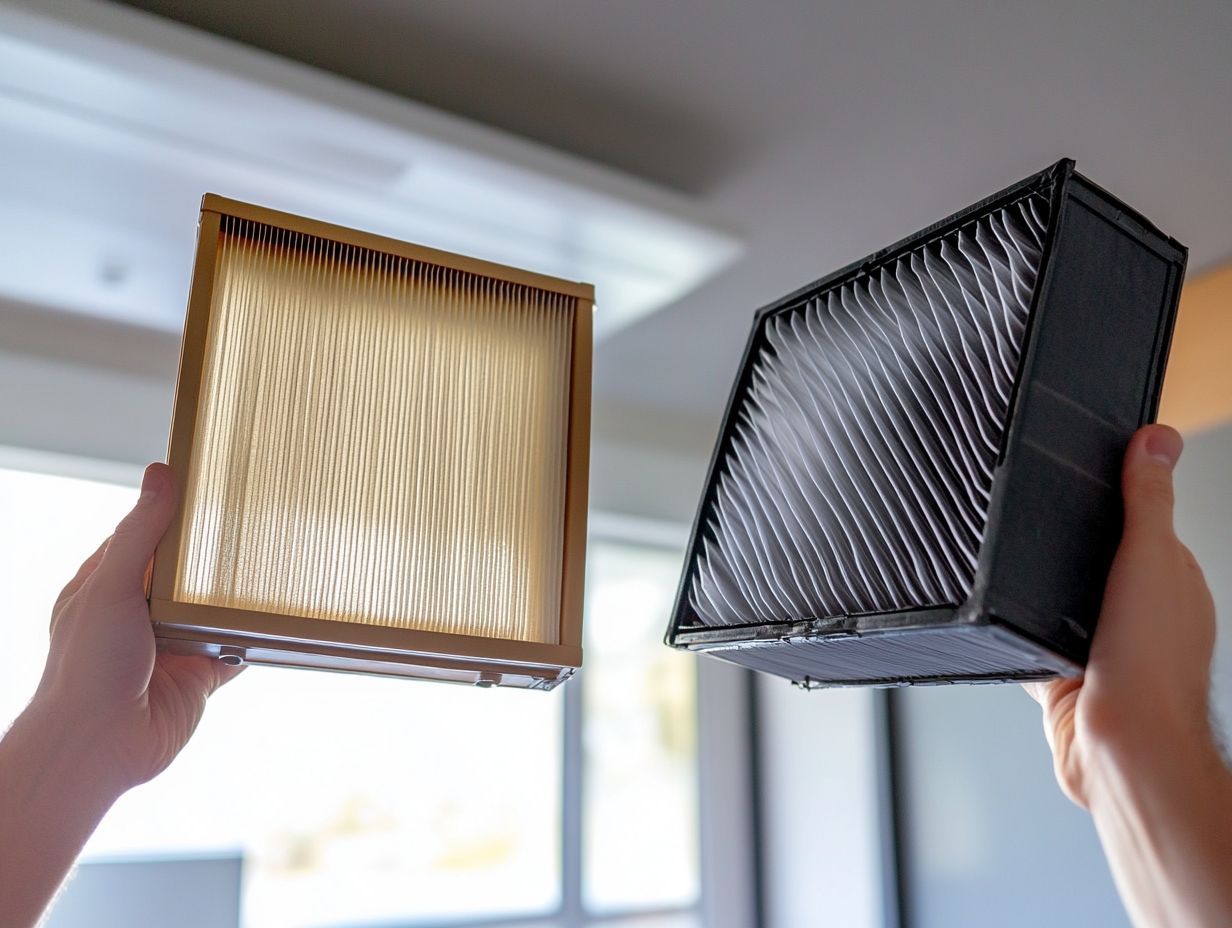
Change air filters every 1-3 months, oil filters every 3,000-5,000 miles, and water filters every 6-12 months.
What happens if I don’t change my filters regularly?
If filters are not changed regularly, they can become clogged and dirty, leading to decreased efficiency and potential damage to the systems they protect. This can result in costly repairs and replacements.
Are there any benefits to changing filters regularly?
- Improved indoor air quality
- Better fuel efficiency
- Increased longevity of equipment and systems
Can I change my filters myself or do I need a professional?
In some cases, filters can be changed by the owner or operator, but it’s best to consult the manufacturer’s instructions or a professional for proper installation and maintenance. This ensures the filters are changed correctly and the systems continue to function effectively.
Start changing your filters today to enjoy a cleaner, healthier home!
Is it necessary to change filters even if they still look clean?
Wondering if you should change your filters, even when they look clean? The answer is a resounding yes!
It’s crucial to replace filters, even if they seem fine. Filters, like air filters, can gather dust and debris that you can’t see. Regular changes, such as fluid changes, prevent these particles from piling up and keep your system running smoothly.





